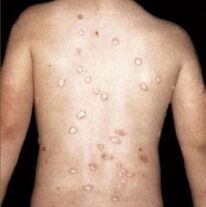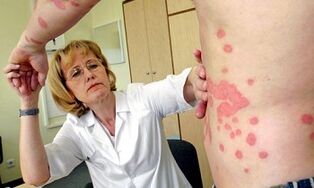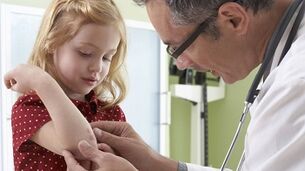
A non-communicable chronic disease. According to statistics, it affects a few percent of the entire population. It is psoriasis. Its symptoms are focal rash, itching and intense peeling of the skin.
The disease can develop at any age, regardless of the social environment a person belongs to. Psoriasis occurs equally in men and women. The disease most often affects young people younger than 20 years old.
Many people are interested in this question: "Does psoriasis itch, what are its symptoms and treatments, and most importantly, is it contagious? " Psoriasis itch is found in almost 85% of cases, butThe disease is not contagious at all, nor is it spread through air droplets or household means. It is difficult to treat, but complex treatments almost always produce good results.
Disease manifestations
How does psoriasis manifest itself and what disease is it? Psoriasis plaques usually form first in the most frictional areas (such as the elbows or knees).
Moreover, the signs of psoriasis can appear on almost any area of the skin-head, face, back, abdomen, palms, feet, armpits and even genitals.
If we consider another similar disease-eczema, then it will affect the inside of the flexor surface, with psoriasis-the outside of the knee and elbow.
Pathology is chronic, with ups and downs, that is to say, under the influence of treatment methods, the person's condition can be improved, or under the influence of unfavorable factors, the condition will deteriorate, and remission and deterioration are usually completely spontaneousof.
Relapse can be caused by alcoholism, stress, and infectious diseases. Throughout the course of the disease, the severity of psoriasis varies from person to person, even for the same person.

The main symptom of skin psoriasis is plaques, which appear as mild lesions in some areas. In some cases, they can cover the entire body.
Psoriasis can develop over time, especially if proper measures are not taken to correct it. The progression of the disease lies in the increase in the exacerbation period and the increase in the diseased area, as well as the involvement of healthy skin areas in the inflammatory process. In some cases, the disease continues to progress without remission.
Many times, nail dystrophy-nail damage occurs. This disease can proceed on its own without adding skin lesions. In addition, psoriasis can lead to the development of the inflammatory process of joints-psoriatic arthritis (diseases of the small joints of the lower extremities and hands), and onychomycosis is found in about 15% of psoriasis patients.
There are many ways to treat this disease, but due to the tendency of this disease to recur and worsen, psoriasis is difficult to treat. Complete healing is almost impossible, that is, until a person dies, it is impossible, but with proper treatment and following all medical prescriptions, a longer period of remission can be achieved.
Reason
So far, medicine has not yet known the true cause of this pathology, but it has been proven that immune system dysfunction, neurological diseases and metabolic diseases can cause the disease. There are many factors that can trigger the development of the disease:
- Genetic susceptibilityIn other words, simple inheritance. Experts say that the signs of psoriasis can be found in people with blood relatives suffering from psoriasis. In addition, if one of the parents gets sick, the risk of the disease will rise to 20%, if both parents rise to 50%. This is due to the presence of certain genes that cause dermatological changes. Usually, the first signs of hereditary psoriasis appear before the age of 25.
- Nervous system diseases.Any emotional shock, nervousness, and chronic fatigue will lead to the development of the disease. In addition, in patients with psoriasis, any stressful situation may exacerbate the disease.
- Hormonal failure.All pathological changes in the organ function of the endocrine system can trigger the mechanism of disease development.
- Violates the metabolic process.Metabolic disorders related to the lack of beneficial trace elements and vitamins in the body can lead to psoriasis.
- Invasion of worms.Certain types of parasites can cause disease. Many laboratory studies have been conducted, and the results have shown that many patients with psoriasis are infected with Giardiasis, Aspirin biliary disease, Assimiasis, Intestinal helminthiasis. The problem is that worms release toxic substances during their life activities, which poison the entire body. This leads to the deterioration of chronic diseases and a significant decrease in immunity.
- Virus infectioncan also attack the human immune system.
It can be clearly seen from the above that the development of psoriasis is in some way related to the disorder of the body's defense mechanism. Under the combined effect of the whole triggering factors, or under the influence of factors such as unbalanced diet, climate change, alcoholism and smoking, physical psoriasis will develop.
Clinical manifestations and types of psoriasis
How does psoriasis start? The first symptom of the disease is the appearance of patchy red patches and itching, similar to lichens. Over time, these spots will peel off and a dense layer of scales is found underneath them.
The so-called Kenber phenomenon is observed when the disease starts to develop, when plaques appear on the skin trauma site (wounds, cuts, burns).
Variety
There are several types of psoriasis, each with specific clinical features:
- Plaque (true psoriasis)is the most common form of the disease, and it occurs in more than 80% of all patients. The skin is inflamed, dry, and thickened, with raised areas above it, covered with light silver scales. The skin in these areas feels hot to the touch and keeps falling off. After peeling, reddened inflammatory foci are found, often damaged and bleeding. Inflammation can merge into large lesions. For psoriasis on the elbows and knees, peeling is not obvious.
- Drop-shaped-There are many small red or purple rounded dry inflammations, which are higher than the skin surface. Intestinal psoriasis covers most areas of the body. The initial symptoms of the disease may occur after a previous sore throat or pharyngitis caused by a streptococcal infection.
- Impetigois the most difficult form of the disease. A blistering rash foci above the surface of healthy skin. These bubbles are filled with exudate. Around the pustules, the skin becomes red, swollen, thickened, and then peeled off. In secondary infections, the blisters are filled with purulent fluid. Generally, this type of psoriasis is limited and affects specific areas such as the lower legs and forearms. In severe cases, the inflammation begins to spread further along the skin surface, and the spots of the rash merge into one focal point.
- Psoriatic Arthritis-The pathological process involves joints and connective tissue. The main manifestation of this form is severe itching. In addition, the skin of the finger joints becomes painful, swollen, peeling and peeling.
- Thyroid dystrophy (nail psoriasis)It looks like mycosis. With this disease, the appearance of nails changes, they become brittle and fall off, and the color of the nail bed and the plate itself may turn yellow or gray. In addition, white spots, dots and horizontal lines will appear on and under the nails. The skin under and around the nail becomes hard. Onychomycosis usually causes nail loss.
Other symptoms of psoriasis include:
- Bleeding from the wound (in the skin wound);
- nail erosion;
- Severe itching; Fever, swelling, and joint pain in psoriatic arthritis (not always).
How the disease develops
The onset of the disease is divided into several stages:
- Progressive.This is the initial stage of the disease. It is characterized by a worsening of the disease and an increase in the number of new rashes.
- Fixed.At this stage, the symptoms of the disease remain unchanged, that is, the rash and other symptoms of psoriasis do not increase or decrease.
- The return stage.In the final stage of the disease, there will be no rash when it continues.
Depending on the prevalence of the inflammatory process, the disease may be:
- Limited-A small area of the skin is affected;
- Common-Large areas of the skin are affected;
- Generalized-Almost the entire body surface is affected.
Among other things, psoriasis is considered a seasonal disease, which means that all symptoms get worse with the seasons. Most people usually get worse in winter or summer. In some patients, the process has nothing to do with seasonal changes.
Diagnosis

How is the disease diagnosed? The diagnosis of psoriasis is mainly based on an examination by a dermatologist. Inspection can find the shape and extent of the lesion.
In some cases, a differential diagnosis is made to distinguish psoriasis from another skin disease. How to identify patients with this particular disease?
As mentioned earlier, in psoriasis, the Kember phenomenon is observed, which is not inherent to dermatopathology. When there is a shallow edge around a new papule that has not yet been peeled off, another symptom should be considered-a vascular reaction, which indicates the further development of the disease.
Sometimes a skin biopsy can be used to make the diagnosis more accurate, or a test that can detect the inflammatory process in the blood is performed. After the diagnosis of psoriasis, you need to start treatment immediately.
Treatment
Drugs
The main treatment is to use topical preparations in the form of ointments, gels, creams and sprays.
The ingredients contained in these medicines prevent excessive skin cell division and relieve the uncomfortable symptoms of itching. Many substances that can effectively fight this disease can be identified:
- Glucocorticoids.They can reduce inflammation and normalize the immune system.
- Vitamin D.Vitamin D drugs are most effective when the patient's condition is stable and when the disease has entered a stable phase. Good results can be obtained by combining such drugs with UV irradiation procedures.
- Silicon.Improve skin condition, have absorption effect and absorb antigens related to disease development.
- Tarhas a good effect on the inflammation focus (located on the head).
- Lecithin.Promote rapid tissue regeneration. Preparations using this substance can help the body to deal with inflammation faster.
- Active Zinceliminates redness and relieves itching in a short time.
Patients are also prescribed drugs in the following categories:
- Corticosteroids-Normalize the metabolic process;
- Cell inhibitors-Prevent cell division, but weaken the body’s defense mechanism;
- Immunomodulator-It can also regulate the immune response, but its effectiveness is still in doubt;
- Non-steroids-Relieves inflammation and itching.
Vitamin complex is used in combination with these drugs.
In addition to medication, the following methods are very popular:
- Sham therapy.Water Lee treatment can improve blood circulation and normalize immune mechanisms.
- Cryotherapy.A special "freeze" method can reduce itching, swelling and inflammation.
- Ultraviolet radiation.These short-term procedures are combined with the introduction of special drugs.
Attention!Self-medication for psoriasis is unacceptable, because many drugs have contraindications and are only prescribed by experts when considering the individual physiological characteristics of the patient.

Children usually suffer from milder psoriasis than adults, so local treatment can achieve good results. Even if the condition gets worse, repeated treatment can achieve long-term relief.
Even if a child is diagnosed with a severe illness and appropriate treatment is given in time, the prognosis will be more or less favorable.
The main rule for parents is to know how to recognize the characteristic symptoms of psoriasis and start fighting the disease immediately!
Traditional Medicine
Traditional medical recipes are often used to treat psoriasis. Herbal based compression will be effective.
To compress, grind 4 tablespoons. Spoon dried herbs, pour a cup of boiling water, and then make it brew. In the broth, you need to moisten the gauze and apply to the painful area.
The following plants have healing properties:
- Calendula;
- Horsetail;
- Walnut leaves;
- Celandine;
- European arrow grass;
- Sweet clover;
- cattle d;
- Black currant leaves.
You can also prepare oral tinctures. For this, 1 tablespoon. One spoonful of dried herbs should be poured into a glass of boiling water for 8 hours. Filter and drink 100 ml twice a day, preferably half an hour before meals. Suitable for herbal collection:
- St. John's Wort;
- Celandine;
- Sequence;
- cotton candy;
- Valerian.
Attention!Some of these herbs can cause side effects, so you must be familiar with all contraindications before starting treatment.

Home ointments are very popular. Here are some effective recipes:
- Burn the dried rose hips and mix the ash with petroleum jelly. The ointment should be applied to the affected area every day.
- Grind celandine leaves to make 2 tablespoons. Spoon, add lanolin and petroleum jelly. An ointment to treat skin inflammation.
- Mix the agent with lanolin and petroleum jelly and rub it into psoriasis plaques.
- Grind meadow sweet root, mix it with oil or petroleum jelly, boil the ointment produced, cool and apply sore spots.
Soothing herbal tea is beneficial. They can be brewed with motherwort, oregano, chamomile, mint, thyme, valerian, linden, and peony.
Traditional medicine cannot guarantee 100% results, it is best to combine it with the main treatment method.
Psoriasis and pregnancy
Many women with psoriasis in position worry about the manifestations of the disease during this period.
Psoriasis is an unpredictable disease, so it is difficult to answer the following question: "How to determine the course of the disease during pregnancy". The symptoms of psoriasis may begin to develop, remain stable or lessen. In some cases, the disease disappears completely after delivery.
Every pregnant woman is worried that the disease can be transmitted to the baby, but the disease itself is not hereditary, but just its cause.

During breastfeeding, if the mother is receiving strong medication, breastfeeding is very dangerous because this substance can harm the health of the baby. In this case, you need to interrupt treatment or transfer the baby to artificial feeding.
The disease does not affect the fetus's conception and intrauterine development, but the medications taken by the mother-to-be may cause undesirable consequences, so it is important to consult your doctor during pregnancy planning, and they will cancel some of these medications.
Prevention
It is impossible to prevent this disease, but its manifestations can be greatly reduced. In order to reduce the symptoms of the disease, you need to follow the following prevention rules:
- Try not to be nervous and learn to control your emotions. Natural tranquilizers can be used to alleviate this work.
- Cut down on salty, smoky, spicy, fried and high-fat foods, as well as honey, citrus fruits, chocolate and coffee.
- Wear clothes made of natural fabrics.
- Choose low-pH personal care products that will not dry out or irritate sore skin.
- Pay attention to medication, because many medications can cause psoriasis, and antibiotics are especially dangerous.
- Quit smoking and drinking.
- Avoid direct sunlight.
Psoriasis is one of the most common skin diseases, and its nature is still not fully understood. The disease causes many inconveniences, worsens the quality of life and lowers people's self-esteem.
It can happen suddenly, unfortunately, no one is immune to this disease. This is why it is very important to understand the manifestations of this pathology in order to consult a doctor in time and start treatment.























